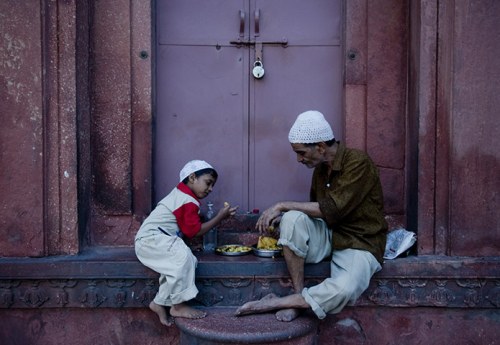
Sahl b. Sa’d (Allah be pleased with him) reported Allah’s Messenger sallallahu ‘alayhi wa salam as saying: “In Paradise there is a gate which is called ar-Rayyan through which only the observers of fast would enter on the Day on Resurrection. None else would enter along with them. It would be proclaimed: ‘Where are the observers of fast that they should be admitted into it?’ -and when the last of them would enter, it would be closed and no one would enter it.”
reported by Muslim in Kitab al-Sawm Hadith 2569
so insha’Allah what follows are some easy Sunnah fasts that we can keep beyond the month of Ramadhan so that we can, insha’Allah, be of those who enter Jannah through the gate of ar-Rayan:
Fasting for six days in the month of Shawwal:
It is narrated on the authority of Abu Ayoub al-Ansari (may Allah be pleased with him) who said that the Messenger of Allah sallallahu ‘alayhi wa salam said: “He that observed fasting in Ramadan then he follows it with six days of Shawwal, this is equal to the fasting of the whole year” [Bukhari: 2758]
Observing fast for three days every month:
It is narrated on the authority of Abu Hurayrah (may Allah be pleased with him) who said: My friend (the Messenger of Allah sallallahu ‘alayhi wa salam) directed me to observe fast for three days in every month, to perform two Rak`ah (optional) Duha prayer at forenoon and to perform the Witr prayer before going to bed. [Agreed upon:1672 & 1178]
It is mustahabb to observe this fast in the middle of the hijri month, on the days called Ayaam al-Beed. It was narrated that Abu Dharr said: “The Messenger of Allaah sallahu alayhi wa salam said to me, ‘If you fast any part of the month then fast on the thirteenth, fourteenth and fifteenth.’” (al-Nasaa’i, 2424; Ibn Maajah, 1707; Ahmad, 210; classed as saheeh by al-Albaani in Saheeh al-Jaami’ al-Sagheer, 673).
Fasting Mondays & Thursdays:
It was narrated that ‘Aa’ishah said: “The Messenger of Allaah sallahu alayhi wa salam was keen to fast on Mondays and Thursdays.” (al-Nasaa’i, 2320; classed as saheeh by al-Albaani in Saheeh al-Jaami’ al-Sagheer, 4827).
The Prophet (peace and blessings of Allaah be upon him) was asked about fasting on Mondays and Thursdays, and he said: “Those are two days on which people’s deeds are shown to the Lord of the Worlds, and I want my deeds to be shown to Him when I am fasting.” (al-Nasaa’i, 2358; Ibn Maajah, 1740; Ahmad, 8161; classed as saheeh by al-Albaani in Saheeh al-Jaami’, 1583).
Observing fast on the day of Arafah:
It is narrated on the authority of Abu Qatadah (may Allah be pleased with him) who said that the Messenger of Allah sallallahu ‘alayhi wa salam said: “Fasting on the day of ‘Arafah is an expiation for two years, the year preceding it and the year following it.” [Muslim: 3746]
Observing fast on the day of Ashurah:
It is narrated on the authority of Abu Qatadah (may Allah be pleased with him) who said that the Messenger of Allah sallallahu ‘alayhi wa salam said: “Fasting the day of ‘Ashurah is an expiation for the year preceding it.” [Muslim: 3746]
the Prophet sallallahu ‘alayhi wa salam told us that his Lord said: “My slave does not draw near to Me with anything more beloved to Me than the religious duties I have enjoined upon him, and My slave continues to draw near to Me with supererogatory works so that I will love him, When I love him, I am his hearing with which he hears, he seeing with which he sees, his hand with which he strikes and his foot with which he walks. Were he to ask [something] of Me, I would surely give it to him, and were he to ask Me for refuge, I would surely grant him it.”
(al-Bukhaari, 6502)
useful links:
Days on which it is prescribed to observe naafil (supererogatory) fasts





